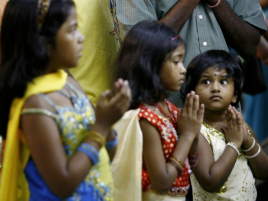ISKCON Seattle Welcomes Children of All Faiths
By Madhava Smullen | May 01, 2010

In an effort to create community, build bridges, and promote communication and dialogue amongst different faiths, ISKCON Seattle is holding the first annual “Children of Faith” program at its Sammammish temple on Saturday May 1st.
Children aged 4 to 16 from many different faith groups, including Turkish Muslim, Indian Christian, Bahai, Jain, Sai Baba, and of course ISKCON, will present their artistic performances between 4pm to 9pm, with individual children—mostly Hindu—also performing.
The line-up of at least fifteen performances will include plays, songs, and prayer recitations.
The ISKCON groups, for instance, will perform traditional bhajan songs, a play about the marriage between Sita Devi and Lord Rama, a Bhagavad-gita recitiation, and a recitation of the ancient poem Brahma-Samhita.
The South Indian Vaishnava group Sampradaya, who recently held a day camp at the Seattle ISKCON temple during Spring Break, will also perform a play.
Also appearing will be the Turkish Muslim group Acacia Foundation, whose mission is to promote cross–cultural dialogue by emphasizing universal values such as love, truth, faith, brotherhood, solidarity, and sharing. They are also dedicated to encouraging strong family values, high morals, and ethics among community; and to helping establish a society where individuals love, respect, and accept each other as they are.
Alongside the performances, devotees will hold a vegetarian food fair serving kid-friendly food such as pizzas, veggie wraps and some specialized Indian dishes.
“This event will give children the chance to express their faith in God, to share their different traditions, and to dialogue with each other in a way that’s fun and educational, rather than confrontational,” says ISKCON Seattle president Hari Vilasa Dasa. “It will also establish dialogue amongst the parents, as they help in the preparation and appreciate the performances by each others’ children.”
Such dialogue rooted in culture rather than doctrine, Hari Vilasa feels, is far more effective in creating understanding than the double dead-ends of “I believe this,” and “You believe that.”
The ISKCON children will not water down their tradition’s philosophy in any way, he is careful to point
out—and neither will the children of other faiths. “Nobody’s belief system will be threatened,” he says. “Yet at the same time, we will create a forum where people can break down the barriers of suspicion and misunderstanding, and appreciate the best of each others’ cultures.”
As well as benefitting different faith groups, programs like “Children of Faith” will specifically benefit
ISKCON, Hari Vilasa believes.
“In my experience, the Hare Krishna movement is at best only tolerated,” he explains. “So here, instead of making assumptions, we’re asking what can we do to allay peoples’ suspicions so that they will enquire further instead of just looking at us and walking away.”
Many of the groups participating in this weekend’s event would not have come to the temple for a traditional “Sunday Feast” program. Yet Hari Vilasa expects “Children of Faith” and other similar programs to break down barriers and build channels of dialogue and friendship both inside and outside of the Hindu community.
“They make us visible and integrate us into the local network,” Hari Vilasa explains. “After “Children of Faith,” the various groups who participated will think of us and invite us whenever they organize a program of their own.”
Eventually, he feels, even the more hesitant American Christian groups will develop enough trust to open up dialogue.
“Catholic priests and Lutherian ministers both attended the prayer meeting we organized for the recent tragedy in Sri Lanka,” he says. “It’s only a matter of time before they reach out to our invitations for more direct dialogue.”















